
The recent slowdown in India's economic growth is an 'aberration' mainly due to the temporary disruptions in preparation for the goods and services tax, the World Bank said on Thursday, pointing out that it will get corrected in the coming months.
World Bank President Jim Yong Kim also said that the GST is going to have a hugely positive impact on the Indian economy.
"There's been a deceleration in the first quarter, but we think that's mostly due to temporary disruptions in preparation for the GST, which by the way is going to have a hugely positive impact on the economy," Kim told a group of reporters during a conference call ahead of the annual meeting of the International Monetary Fund and the World Bank in Washington, DC.
Union Finance Minister Arun Jaitley would be leading the Indian delegation to the annual meeting next week.
Kim was responding to questions on slowdown in India's growth in the first quarter, which the Opposition and several economists have attributed to demonetisation and the GST.
India's GDP grew 5.7 per cent on a year-on-year basis during the April-June period (Q1). During the previous quarter (January-March) the GDP had grown by 6.1 per cent.
The GDP growth rate for the same quarter last year was 7.9 per cent.
Responding to questions, the World Bank president insisted that this slowdown is temporary.
"We think that the recent slowdown is an aberration which will correct in the coming months, and the GDP growth will stabilise during the year. We've been watching carefully, as Prime Minister (Narendra) Modi has really worked on improving the business environment, and so, we think all of those efforts will pay off as well," Kim said.
Next week, both the World Bank and the IMF are expected to come out with their new GDP figures and growth projections for India and the rest of the world.
"Let me just say, as I said from the beginning. I'm not sure that I could say that any country in the world is investing enough in their human beings. I think there's no country in the world that can't improve its healthcare system. There's no country in the world that can't improve its educational system," Kim said.
Ahead of the annual meeting, Kim said after years of disappointing growth, the global economy has begun to accelerate, and trade is picking up as well, but investment remains weak.
"We are concerned that downside risks such as a rise in protectionism, policy uncertainty, or possible financial market turbulence could derail this fragile recovery," he said.
"Countries need to continue to advance their reform agenda, they need to invest in people. They need to build resilience against overlapping challenges, including the effects of climate change, natural disasters, as well as conflict, forced displacement, famine and disease."
Responding to a question on India and human capital, Kim said Prime Minister Modi has made a huge commitment to sanitation issues, and 'Swachh Bharat' is one of the 'most effective programmes' anywhere.
"I know that Prime Minister Modi himself personally is very committed to improving opportunities for all of India. But, India has a lot of challenges. We look at some of the educational outcomes, we've looked at some of the health outcomes, and India has room to improve, like most other countries," he said.
"Our job is to take the political will and commitment that Prime Minister Modi has clearly demonstrated and has communicated to everyone, and then bring to India the most effective intervention that will, as quickly as possible, improve the stock of human capital," Kim said.
That's the message for every country in the world, he said.
"The Bank stands ready, with lots of new insights on how to improve health outcomes and improve education outcomes to help every country in the world with financing, with technical knowledge, and with direct support around implementation that will lead to a situation where we can talk about an emerging equality of opportunity, which has got to be the central focus of all this work," he said.
Kim said investing in people drives economic growth. But far too many leaders undervalue the contribution of human capital which one builds through effective investments in people through health care, quality education, jobs and skills.
"Human capital is the key to reducing poverty and to reducing inequality," he said.
This year, the Bank is producing a new report in a series on 'The Changing Wealth of Nations'. For the first time, it has added human capital to its wealth analysis, in addition to produced capital, things like machinery and buildings, natural capital, energy, forests, agricultural lands, and net foreign assets, he said.
Illustration: Uttam Ghosh/Rediff.com











 © 2025
© 2025